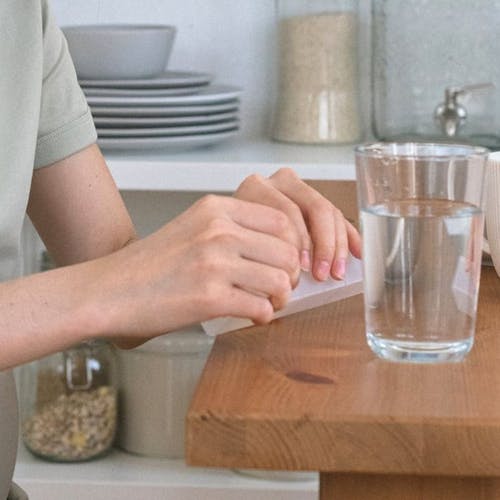This website uses cookies to enhance the user experience. By using Yoppie you are agreeing to our use of cookies.
Your Guide To Periods On The Pill
Written by Yoppie
04 Apr 2022
What even is the combined pill??
So… what type of pill is best?
What will the pill do to my periods?
Can the pill cause any problems?
Which type of pill should I use?
Thinking of starting the pill? Whether for contraception or regulating hormones, you may be wondering what will happen to your periods. It’s a legitimate concern since the pill can alter your cycle, so here’s your guide to periods on all the different kinds of pills, what’s likely to happen, and any symptoms to watch out for…
What even is the combined pill??
There are many types of contraception, but one of the most popular is the combined oral contraceptive pill, often referred to as "the pill". These are tablets you swallow containing synthetic versions of the hormones oestrogen and progesterone - the kind made by the ovaries - and are designed to stop eggs releasing, thicken cervical mucus to make it harder for sperm to move, and thin the uterine lining so an egg can’t implant. They are over 99% effective if taken properly, and can also improve symptoms of other conditions.
So… what type of pill is best?
It can seem like a bit of a minefield! The Sexual Health Hub has a list of the different brands and hormones in each, so let’s just focus on the categories. There are three; monophasic, phasic, and every day (ED) pills.
- Monophasic 21-day pills are the most commonly prescribed, and deliver the same amount of hormones for each day you take them - that’s oestrogen and progestin. They should be taken every day for 21 days, followed by 7 days of no pills which is the window where you can expect to bleed.
- Phasic 21-day pills contain different colours of pills in each pack, all with varying levels of hormones. As above, one pill should be taken every day for 21 days, but in the right order according to the packet. After this, no pills are taken for 7 days which again is when you should bleed.
- Every day (ED) pills are what they sound like; pills you take every day! These are handy for those who struggle to stick to the schedule as they offer a more consistent option. In the pack, there are 21 active pills and 7 inactive, and users should take them in order every day.
One other variation to mention is the “mini-pill”, containing only progestin and no oestrogen. Some people opt for this if they have, for example, hormone issues requiring them to avoid oestrogen, or if they are breastfeeding. The mini-pill is now available in pharmacies without a prescription, but you need to discuss with the pharmacist to ensure it’s right for you.
What will the pill do to my periods?
Here’s the bit you’ve been wondering about… how the birth control pill is likely to affect your monthly bleed! Let’s start with the combined pill, the kind with both oestrogen and progestin. This is known to reduce bleeding for most people, and make periods more regular. It can also reduce painful menstrual cramps and other PMS symptoms, so it’s a popular choice for those who have had difficult periods in the past.
Some people still experience breakthrough bleeding (bleeding on unexpected days), heavy bleeding or light spotting between periods, but this is a normal side effect and often disappears after a few months. Keep in mind spotting is the most common side effect of birth control pills, as your body is adjusting to changing hormone levels.
The mini-pill (known as progesterone-only) is different as it affects the ovulation process but doesn’t entirely stop it like the combined pill. This means if you previously experienced cramping during ovulation then you may still get this. The mini-pill may make periods lighter or stop altogether, but like the combined pill, some people still get spotting or heavy bleeding. It’s usually all about trial and error to see what works for you over a few months.
Can the pill cause any problems?
As with any type of medication, there are some side effects to watch out for when taking the pill, and these include nausea, breast tenderness, weight gain, mood changes, headaches/migraines, missed periods, decreased sex drive, discharge, and in rare cases, vision changes. The pill is generally considered safe for most people with periods to use, but if any of the side effects above start to cause you distress, speak to your doctor.
Some risks are important to keep an eye on, for example, breast tenderness is common but breast lumps should be checked. Similarly, mood changes are normal but depression is not something you should put up with. One 2016 study found a link between hormonal contraception and depression, so being aware of your monthly cycle of emotions is key.
One of the most serious risks of hormonal contraception is blood clots, and although they are very rare (the rate is around 0.3% to 1% over 10 years) it’s important to know the signs, such as chest pain, shortness of breath, severe headaches, eye problems (blurred, spotted vision, or loss of vision), swelling/aching in the legs, and more.
Which type of pill should I use?
Speak to your doctor about which type of contraceptive is best for you. In most cases, the first option offered will be a monophasic pill, however your doctor can advise based on your medical history, previous contraceptive experience, health issues and desired outcomes with regards to your lifestyle, to make sure you have the best option to suit you.
Want to know more about the pill? We love to answer your questions! Let us know what’s on your mind in our Full Stop FB group, or get in touch directly on Instagram at @itsyoppie. Don't forget that our personalised menstrual care subscription can get organic tampons, PMS supplements and much more delivered easily and regularly through your letterbox, whatever your flow.
Section jump
Back to top
Subscribe To Our Newsletter
YOPPIE





© 2026 Yoppie is a registered trademark of Phlo Technologies Ltd.
Yoppie's supplements are not a substitute for a varied diet and healthy lifestyle and are not intended to diagnose, treat, or cure any disease. If you are pregnant, breastfeeding, have a medical condition or are under medical supervision, please consult with your doctor before taking any of our products.






